|
|
|
Sort Order |
|
|
|
Items / Page
|
|
|
|
|
|
|
| Srl | Item |
| 1 |
ID:
174490
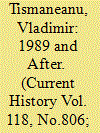

|
|
|
|
|
| Summary/Abstract |
Nations that endured communist dictatorships must come to terms with the traumas of the past before durable democracies can take hold—a lesson the author learned firsthand in Romania.
|
|
|
|
|
|
|
|
|
|
|
|
|
|
|
|
| 2 |
ID:
024530
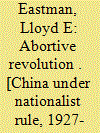

|
|
|
|
|
| Publication |
Cambridge, Harvard University Press, 1974.
|
| Description |
xvii, 398p.hbk
|
| Standard Number |
674001753
|
|
|
|
|
|
|
|
|
|
|
|
Copies: C:1/I:0,R:0,Q:0
Circulation
| Accession# | Call# | Current Location | Status | Policy | Location |
| 014655 | 951.042/EAS 014655 | Main | On Shelf | General | |
|
|
|
|
| 3 |
ID:
176452
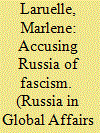

|
|
|
| 4 |
ID:
112145
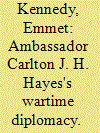

|
|
|
|
|
| Publication |
2012.
|
| Summary/Abstract |
U.S. Ambassador to Spain (1942-1945), Carlton J.H. Hayes, has been often reputed a Francoist. A look at the entire printed and archival record, however, shows Hayes to have been a tough critic of the caudillo's "fascism." This article focusses particularly on Hayes' active role in securing the passage of some 40,000 refugees-French, Anglo-Saxons, Jews and others-across the Pyrenees mostly to North Africa. In retirment, Hayes advocated patient dilomacy, rather than ostracism or subversion of Franco Spain-the policy the U.S. eventually adopted.
|
|
|
|
|
|
|
|
|
|
|
|
|
|
|
|
| 5 |
ID:
185796
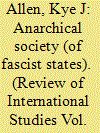

|
|
|
|
|
| Summary/Abstract |
While scholars within the English School have increasingly approached the traditionally liberal concept of solidarism in a normatively agnostic fashion, the idea of an ‘illiberal solidarism’ and historical manifestations thereof remain underexplored. One notable case in point surrounds the peculiar body of Italian interwar international thought, herein referred to as ‘international Fascism’. By discerning a synchronic outline of international Fascism, alongside the manner by which this project mutated and ultimately failed as it transformed from a vision theorised in the abstract to a practical initiative under the auspices of the Fascist regime, this article offers historical and theoretical insights into the realisability of illiberal forms of solidarism. Combining this historical account with theoretical insights derived from Reus-Smit's study on international order under conditions of cultural diversity, this article argues that the realisation of some form of solidarism necessitates the acceptance of a substantive pluralist component. Yet messianic illiberal visions that endeavour to retain the states-system, while simultaneously asserting the superiority of one community or a highly exclusionary vision of the ‘good life’, ostensibly lack the capacity to reconcile the contradictions inherent in efforts to universalise such projects.
|
|
|
|
|
|
|
|
|
|
|
|
|
|
|
|
| 6 |
ID:
031178
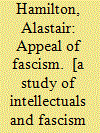

|
|
|
|
|
| Publication |
London, Anthony Blond limited, 1971.
|
| Description |
xxiii, 312p.
|
|
|
|
|
|
|
|
|
|
|
|
Copies: C:1/I:0,R:0,Q:0
Circulation
| Accession# | Call# | Current Location | Status | Policy | Location |
| 007367 | 320.533/HAM 007367 | Main | On Shelf | General | |
|
|
|
|
| 7 |
ID:
142834
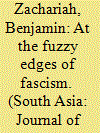

|
|
|
|
|
| Summary/Abstract |
The genealogies of völkisch ideas everywhere would suggest that they were relatively widespread in a world thinking about defining the nature of nationalism. The idea of the Volk has its origins, of course, in German romanticist imaginings of the German nation. The glorification of an ‘Aryan’ past in India, the identification of the ‘folk element’, or a connection with sacred soil and sacred space, shared the same building blocks of romantic nationalism that were evident across the world. This essay focuses on Indian völkisch nationalism through the work and career of Benoy Kumar Sarkar, his engagements with German and Indian ideas, his ability to translate them across their specific contexts and his institutional linkages.
|
|
|
|
|
|
|
|
|
|
|
|
|
|
|
|
| 8 |
ID:
116843
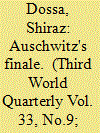

|
|
|
|
|
| Publication |
2012.
|
| Summary/Abstract |
It is passing strange that the existence of Auschwitz has not lessened racism. In fact quite the reverse: it has unleashed surplus racism on the 'Third world' and its 'natives'. As I contend here, this is the Auschwitz finale, its abject truth, the dialectical residue of the Holocaust. Jacob Neusner calls it the Holocaust 'myth' and 'mythic theology'. It now constitutes the ruling narrative in the West. This article dissects the Auschwitz discourse and its denial of other holocausts. It critiques the claim that it was the only 'real' genocide. It advances a contrary thesis on colonialism, racism and holocausts in history. I clarify the affinity between colonialism and fascism and Israeli tactics in Occupied Palestine. It is undeniable that Auschwitz fuels anti-Arab anti-Semitism and anti-Islamism. In my conclusion I analyse Jewish criticism of the Auschwitz finale.
|
|
|
|
|
|
|
|
|
|
|
|
|
|
|
|
| 9 |
ID:
082679


|
|
|
|
|
| Publication |
2008.
|
| Summary/Abstract |
From Byron's death at Missolonghi in 1824 to D'Annunzio's capture of Fiume for Italy in 1919, the nationalism of universal liberalism and independence struggles changed, in literature as in politics, to cruel dictatorial fascism. Byron was followed by a series of idealistic fighter-poets and poet-martyrs for national freedom, but international tensions culminating in World War I exposed fully the intolerant, brutal side of nationalism. D'Annunzio, like Byron, both a major poet and charismatic war leader, was a key figure in transforming nineteenth-century democratic nationalism into twentieth-century dictatorial fascism. The poet's 'lyrical dictatorship' at Fiume (1919-20) inspired Mussolini's seizure of power in 1922, with far-reaching political consequences. The poet became the dangerous example of a Nietzschean Übermensch, above common morality, predatory and morally irresponsible. This article shows how the meaning of nationalism was partly determined and transformed by poets, illustrating their role as 'unacknowledged legislators of the world'
|
|
|
|
|
|
|
|
|
|
|
|
|
|
|
|
| 10 |
ID:
027939


|
|
|
|
|
| Publication |
New York, Rendom house, 1962.
|
| Description |
xvi, 704p.
|
|
|
|
|
|
|
|
|
|
|
|
Copies: C:1/I:0,R:0,Q:0
Circulation
| Accession# | Call# | Current Location | Status | Policy | Location |
| 008775 | 320.5/COM 008775 | Main | On Shelf | General | |
|
|
|
|
| 11 |
ID:
039015
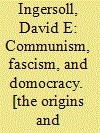

|
|
|
|
|
| Publication |
Columbus, Ohio, Charles E Merill Publishing, 1971.
|
| Description |
v, 190p.
|
| Series |
Merrill political science series
|
| Standard Number |
0675091861
|
|
|
|
|
|
|
|
|
|
|
|
Copies: C:1/I:0,R:0,Q:0
Circulation
| Accession# | Call# | Current Location | Status | Policy | Location |
| 008486 | 320.53/ING 008486 | Main | On Shelf | General | |
|
|
|
|
| 12 |
ID:
115052
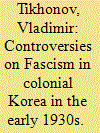

|
|
|
|
|
| Publication |
2012.
|
| Summary/Abstract |
The paper deals with the trends of fascist and fascist-like right-wing social and political thought in colonial Korea in the early 1930s. It shows that in the 1920s, Korea's right wing, its ability to reach out to the masses being severely limited, preferred mostly conciliatory tactics in its relationship with leftist radicals, often making efforts towards inventing 'hybrid' ideologies which would integrate the leftist social concerns into the mainstream religious or nationalist constructions (an example of such a hybrid were various Korean versions of Christian socialism). After the Great Depression, however, Korea's nascent bourgeoisie felt more threatened and became more interested in keeping abreast with right-wing extremist trends in the mother country (Japan) and elsewhere. Such representative ideologists of the Korean propertied class as Yun Ch'iho and Yi Kwangsu were praising Mussolini and employing strong Social Darwinist language in their exhortations to the Korean people to 'regain their vitality and develop [a] spirit of collectivism, obedience and self-sacrifice'. However, until the very end of the 1930s many of Korea's right-wing ideologues remained pronouncedly religious (Yun as Christian, Yi as Buddhist). While highlighting the religious essentials of their worldviews they often abstained from imitating the most extremist traits of European fascist ideologies (for example, anti-Semitism). In many ways, Korea's fascism continued until the end of the 1930s to be an intellectual discourse rather than a mass movement, and retained a strong aura of belonging to more mainstream religious or nationalist traditions.
|
|
|
|
|
|
|
|
|
|
|
|
|
|
|
|
| 13 |
ID:
132367
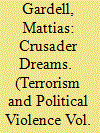

|
|
|
|
|
| Publication |
2014.
|
| Summary/Abstract |
The synchronized terror attacks on July 22, 2011 was the worst politically motivated assault in post-WW2 Norway. To the perpetrator, Anders Behring Breivik, 22/7 was a "marketing operation," designed to draw attention to his compendium, 2083: A European Declaration of Independence. While Breivik acted alone, his political philosophy is far from unique. Through a detailed analysis of the compendium's content, identifying the original authors whose texts Breivik used but did not always acknowledge, this essay discusses the political traditions that informed the assailant's worldview: Islamophobia (anti-Muslim racism), cultural conservative nationalism, antifeminism, and selected elements of White Power thought, far Right evangelical theology, and the Knights Templar tradition, all permeated by romantic male warrior ideals. The stunning violence of July 22 was a hyper-masculine performative act aimed at producing a heroic avant-garde of nationalist warriors who will rise to purge Europe from the corrupting influence of its internal enemies and defeat its external enemies. Through the cleansing fire of the civil war, he believes that a reborn Europe will arise to reclaim its ordained position of glory as the world's leading civilization. In the final analysis, Breivik's political philosophy may thus be recognized as a 21st-century articulation of the fascist legacy.
|
|
|
|
|
|
|
|
|
|
|
|
|
|
|
|
| 14 |
ID:
130958
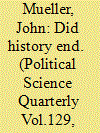

|
|
|
|
|
| Publication |
2014.
|
| Summary/Abstract |
IN A 1989 ESSAY, FRANCIS FUKUYAMA ADVANCED the notion that, with the death of communism, history had come to an end.1 This somewhat fanciful, and presumably intentionally provocative, formulation was derived from Hegel, and it has generally been misinterpreted. He did not mean that things would stop happening-obviously a preposterous proposal.2 Rather, he contended that there had been a profound ideological development. With the demise of communism, its chief remaining challenger after the extinguishment earlier in the century of monarchy and Fascism, liberalism-democracy and market capitalism-had triumphed over all other governmental and economic systems or sets of ordering principles. Looking for future challenges to this triumph, he examined the potential rise of destructive forms of nationalism and of fundamentalist religion, but found them unlikely to prevail. Thus, the triumph of liberalism was likely to be permanent.
This article evaluates developments over the subsequent quarter century and argues that Fukuyama seems to have had it fundamentally right. Beginning with the countries of Eastern Europe, democracy continued its progress after 1989. Moreover, capitalism increasingly came to be accepted, so that when the world plunged into widespread economic crisis after 2007, proposed remedies variously recommended tinkering with the system, not abandoning it.
In the meantime, violent forms of nationalism that surged in some places in the last decade of the old century scarcely proved to be much of a challenge to these trends, and the same seems likely to hold for violent forms of fundamentalist religion that surged in some places in the first decade of the new one. In fact, the significance of both of these illiberal developments seems to have been much exaggerated.
In addition, there was a striking decline of civil warfare during the decade after 1989 to low levels that have held now throughout the new century.
|
|
|
|
|
|
|
|
|
|
|
|
|
|
|
|
| 15 |
ID:
038994
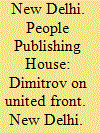

|
|
|
|
|
| Publication |
New Delhi, People's Publishing House, 1971.
|
| Description |
134p.
|
|
|
|
|
|
|
|
|
|
|
|
Copies: C:1/I:0,R:0,Q:0
Circulation
| Accession# | Call# | Current Location | Status | Policy | Location |
| 007431 | 320.532/DIM 007431 | Main | On Shelf | General | |
|
|
|
|
| 16 |
ID:
140254
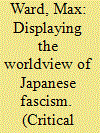

|
|
|
|
|
| Summary/Abstract |
This essay explores an imperial state exhibition held in Tokyo in 1938 and explains how the exhibition displayed a fascist worldview of historical crisis and national regeneration that was taking shape in Japan in the late 1930s. The exhibition – entitled the Thought War Exhibition (Shisōsen tenrankai) – was curated by the Japanese state's newly formed Cabinet Information Division (Naikaku jōhōbu) and held in Takashimaya Department Store in downtown Tokyo. Comprised of materials related to the Communist International, the Spanish Civil War, the national liberation struggle in China, and the communist and anticolonial movements inside the Japanese Empire, the Exhibition portrayed Japan's invasion of the Chinese mainland in 1937 as an extension of a global thought war against communism, requiring all imperial subjects to purify themselves of foreign influences and mobilize for national thought defense. While on the surface this Exhibition was an example of prewar state propaganda, it also expressed a fascist worldview that was coalescing in the Japanese state in the late 1930s. This essay investigates how this fascist worldview was exhibited in a sequence of displays, including dioramas, panoramas, illuminated maps, and display cases, and how these displays revealed constitutive contradictions that underwrote the formation of fascism in Japan.
|
|
|
|
|
|
|
|
|
|
|
|
|
|
|
|
| 17 |
ID:
192445
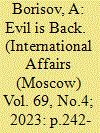

|
|
|
|
|
| Summary/Abstract |
GERMAN philosopher Friedrich Hegel is credited with the well-known idea that history repeats itself twice: first as tragedy, then as farce.
Sometimes a farce does not turn into the harmless theatrical effects of Molière's comedies but can be tragic and bloody, as demonstrated by the policy of the Kiev regime in Ukraine that has revived the criminal ideology, practices, and symbols of Nazism.
|
|
|
|
|
|
|
|
|
|
|
|
|
|
|
|
| 18 |
ID:
045091
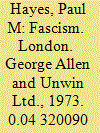

|
|
|
|
|
| Publication |
London, George Allen and Unwin Ltd., 1973.
|
| Description |
260p.
|
| Standard Number |
0.04 320090 7
|
|
|
|
|
|
|
|
|
|
|
|
Copies: C:1/I:0,R:0,Q:0
Circulation
| Accession# | Call# | Current Location | Status | Policy | Location |
| 012873 | 320.533/HAY 012873 | Main | On Shelf | General | |
|
|
|
|
| 19 |
ID:
079496
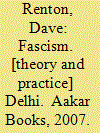

|
|
|
|
|
| Publication |
DelhI, Aakar Books, 2007.
|
| Description |
x, 150p.
|
| Standard Number |
9788189833312
|
|
|
|
|
|
|
|
|
|
|
|
Copies: C:1/I:0,R:0,Q:0
Circulation
| Accession# | Call# | Current Location | Status | Policy | Location |
| 052910 | 320.533/REN 052910 | Main | On Shelf | General | |
|
|
|
|
| 20 |
ID:
031963
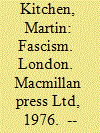

|
|
|
|
|
| Publication |
London, Macmillan Press Ltd, 1976.
|
| Description |
xi,106p.
|
|
|
|
|
|
|
|
|
|
|
|
Copies: C:1/I:0,R:0,Q:0
Circulation
| Accession# | Call# | Current Location | Status | Policy | Location |
| 016179 | 320.533/KIT 016179 | Main | On Shelf | General | |
|
|
|
|
|
|
|
|
|